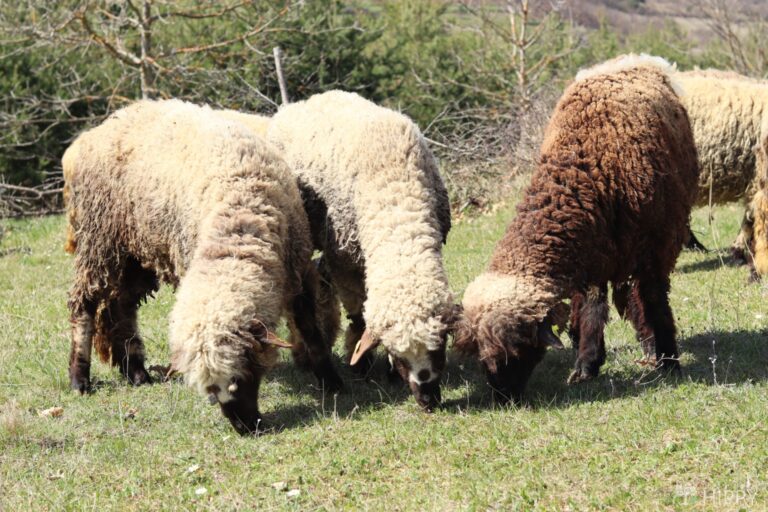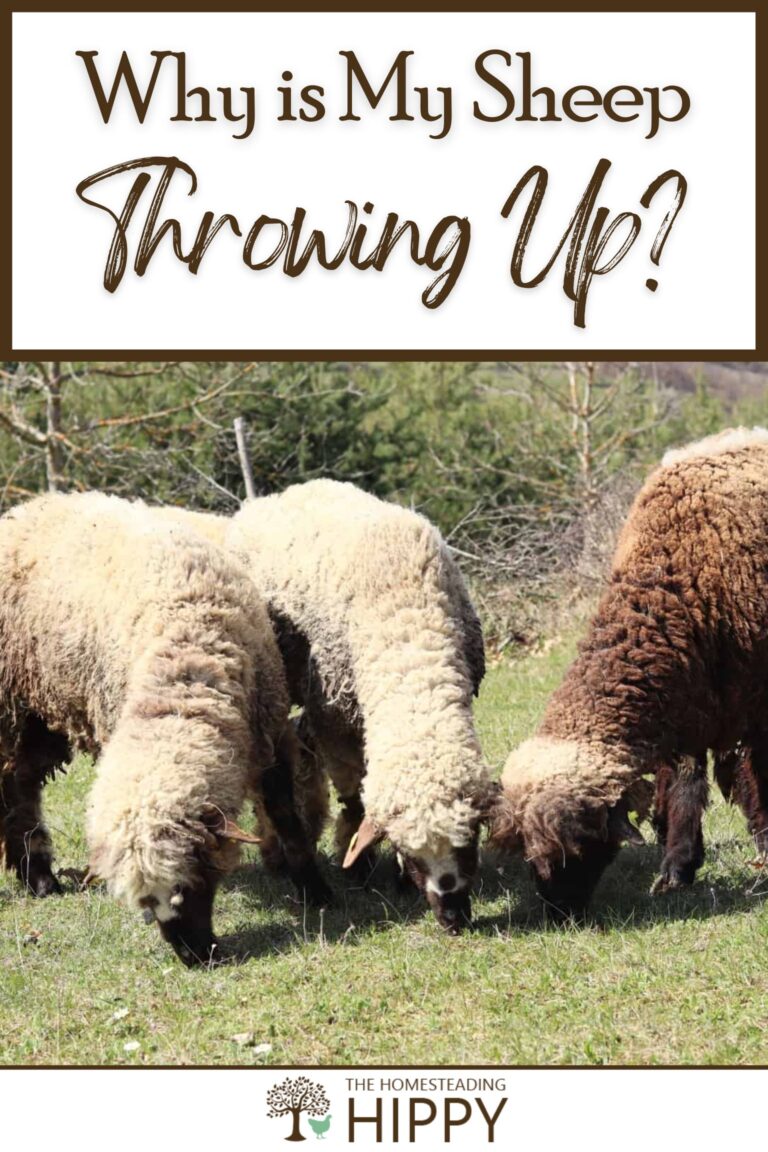Anyone who owns farm animals knows that dealing with health issues and assorted nastiness just comes with the territory. It seems that our animals just cannot get along without our help.

But if you have sheep there is one symptom that might be cause for serious worry, and that is if your sheep is throwing up.
Compared to other animals sheep seem to do fine until, in the next moment, they seem dreadfully sick. And most of the issues are caused by what your goats are eating.
They might be throwing up for a mundane reason or a serious one, but you’ll need to find out in a hurry and act appropriately. So, why is your sheep throwing up?
Sheep will throw up for numerous reasons, including cudding, choking, poisoning, bloat, grain acidosis, or eating a non-food item.
Your sheep might be in serious trouble if it starts throwing up, or it might be doing it for a far less injurious reason.
By knowing what is normal and what is not you can be better prepared to react to real emergencies or breathe a sigh of relief when it isn’t anything to worry about.
The rest of this article will detail some of the most common causes of sheep throwing up. Keep reading to find out more.
1. Cudding
To the uninitiated, sheep may not seem like the most sophisticated of animals. However, these woolly creatures have a surprisingly complex digestive system that allows them to extract nutrients from their food in a process known as rumination.
This process is why sheep and other animals like them belong to a category of herbivores called “ruminants”.
Anyway, during rumination ingested food is first partially digested in the stomach and then regurgitated back into the sheep’s mouth. Yes, it is pretty gross to us, but it serves an important purpose.
The sheep then chews the cud for several minutes to further break it down before swallowing once more and allowing it to be pass through the rest of the digestive tract.
This process allows the sheep to extract more nutrients from its food, but if you were paying attention to the description above you would have noticed that the sheep must regurgitate and throw up the food it has already eaten to keep chewing it.
This sounds and looks about like you’d expect, complete with some drool or even a little spew coming out of the sheep’s mouth.
If you didn’t know better you might think this was cause for alarm, but it is a normal part of a sheep’s day when they are eating.
If your sheep does not seem distressed and is going on eating grass or hay, chewing, and acting normally it is probably just cudding. No need to worry!
2. Choking
While cudding is a normal part of a sheep’s digestive process, choking most certainly is not.
If your sheep appears to be trying to vomit but nothing is coming up, or if it is making gagging noises and gasping (still chewing, somehow) while some bits of food come out then it might be choking.
This can happen if the sheep ingests something it shouldn’t have or if it swallows its food too fast.
Dry foods of any kind, particularly grains, are especially bad about this. Sheep will try to gobble up mouthfuls of the stuff and it will catch in their throat.
That said, sheep can choke on anything, even grass and other fresh plant matter, and lambs can choke on milk if they get ahead of themselves.
This is often pretty scary to witness, and most people feel pretty helpless. Thankfully, sheep are pretty capable of clearing their own airways and you can often just wait it out.
If, however, the sheep is truly struggling you might need to give it a little help. Your best bet, though not a sure one, is to lift the sheep by its back legs so its head is pointing downward and then try to massage the neck with your free hand.
For smaller sheep you can place them over a fence rail or even your knee in the case of lambs.
Pretty soon it should expel the offending blockage and then immediately go back to wanting whatever caused the choking in the first place.
If your sheep is acting normally, you don’t need to worry, but if they continue to cough, gag or act differently you should probably call your vet.
3. Poisoning
Sheep are usually pretty good about not eating things that are truly toxic, but accidents still happen. And, at the end of the day, they are just sheep; animals not renowned for their IQ, if you take my meaning.
This means that sheep are at risk for poisoning if they eat something they shouldn’t, be it something like a poisonous plant or mushroom, or man-made poisons.
When it comes to plants, the most common plants that cause poisoning in sheep are yew, rhododendron, and azalea.
These plants contain compounds that can cause serious heart problems and even outright death in sheep. Yew in particular is deadly poisonous.
Other poisonous plants include foxglove, hemlock, nightshade, and raw acorns. Some of these can cause neurological problems while others will lead to gastrointestinal issues.
In all cases, vomiting is usually a symptom of poisoning as the sheep’s body tries desperately to rid itself of the harmful stuff.
Man-made toxins that commonly affect sheep are fertilizers, herbicides, pesticides, and actual poisons like rodenticides.
The best way to prevent your sheep from getting poisoned is to make sure they are kept well away from any areas where chemicals are used for any purpose and to deploy any purpose-made poison with the greatest possible care while keeping it well away from your livestock.
If you suspect your sheep has been poisoned by anything, you must act as quickly as possible! You can save a sheep if veterinary intervention is timely enough. The first thing you need to do is remove your sheep from the source of the poison.
If it ate a poisonous plant, for instance, get it away from the rest of the flock so they don’t start eating it too.
If you can identify the poison, that will be very helpful in treating your sheep but if you can’t, don’t worry about it. Just try and give as much information as possible to your vet.
4. Bloat
Bloat is a dreaded condition that can affect all ruminants, and is caused by gas buildup in the stomach.
The gas is produced by fermentation and is totally normal, but sometimes it gets trapped and can’t escape, usually resulting from excess production exacerbated by a disruption of the microflora in the rumen itself. This is what we call bloat.
When this happens, the stomach expands like a balloon and puts pressure on the lungs, making it hard for the animal to breathe.
Bloat can also cause twisted guts which cut off blood flow and lead to death. A frothy discharge from or around the mouth accompanying a distended abdomen, obvious pain, and altered behavior are reliable indicators.
Common causes of bloat are too much novel food at once or excess alfalfa hay or pasturage.
Bloat can be difficult to predict and harder to stop, and if your sheep is going to die from it there is usually little you can do.
Prevention is best, so never let your sheep eat too much alfalfa, and always introduce new foods or change their diet slowly to give their rumen time to adjust.
5. Grain Acidosis
Grain acidosis is a condition that can occur when sheep eat too much grain or other high-carbohydrate foods. It’s also sometimes called grain overload or carbohydrate intoxication.
When sheep eat too much grain, their rumen becomes overloaded with carbohydrates which ferment and produce lactic acid. This causes an acidic environment in the rumen which can lead to all sorts of problems.
The most common symptom of grain acidosis is an acute depression followed by sudden death, but other symptoms can include lethargy, weakness, bloating, diarrhea and vomiting.
Grain acidosis is more common in lambs than in adult sheep but adults are still quite susceptible and it is more likely to occur if the sheep are suddenly given access to grain or fed too much in a single serving.
Grain acidosis is usually fatal, either directly or through secondary infections, but prompt and ongoing treatment can save affected sheep. If you see a sheep throwing up and looking “down” following a meal of grain, call your vet at once.
6. Eating a Non-Food Item
Sheep will sometimes accidentally eat something they shouldn’t, and this can cause them to throw up. The most common non-food items that sheep eat are stones, small pieces of wood, plastic bits, twine, or other trash.
This indigestible garbage may clog up a sheep’s digestive system with disastrous and usually fatal results, but with a little bit of luck the animal might be able to regurgitate it.
If you see your sheep eating something it shouldn’t, try and get the item away from them and call your vet for advice if they manage to swallow it. Do not try to induce vomiting yourself.
If your sheep has access to an area where there is a lot of trash, make sure you clean it up to prevent problems, and always carefully inspect hay and other bulk foods for any signs of contamination by garbage.

Tom has built and remodeled homes, generated his own electricity, grown his own food and more, all in quest of remaining as independent of society as possible. Now he shares his experiences and hard-earned lessons with readers around the country.
Find out more about the team here.
